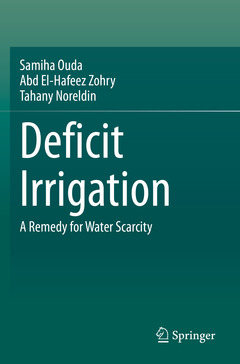Description
Deficit Irrigation, 1st ed. 2020
A Remedy for Water Scarcity
Authors: Ouda Samiha, Zohry Abd El-Hafeez, Noreldin Tahany
Language: English
Subjects for Deficit Irrigation:
Approximative price 105.49 €
In Print (Delivery period: 15 days).
Add to cartPublication date: 01-2021
196 p. · 15.5x23.5 cm · Paperback
Approximative price 105.49 €
In Print (Delivery period: 15 days).
Add to cartPublication date: 01-2020
196 p. · 15.5x23.5 cm · Hardback
Description
/li>Contents
/li>Biography
/li>Comment
/li>
This book focuses on proving that deficit irrigation could play an important role in increasing food production in times of water scarcity. Although the application of deficit irrigation can involve loss in crop productivity, it still secures water to be use in cultivating more lands and producing more food.
The following questions are discussed and the authors offer solutions to these problems:
Will the production, on a national level, resulting from these new added areas compensate yield losses attained by application of deficit irrigation?
Is it possible to use deficit irrigation practice to reduce the applied irrigation water to certain crops that have a surplus in their production, and direct this saved water to cultivate new areas with crops have low self-sufficiency ratios?
Under climate change in 2030, would deficit irrigation practice have the same role it plays under the current conditions?This book will appeal to students and researchers involved with water scarcity and food security.
Preface, Dedication
Chapter 1: Water scarcity leads to food insecurity: An introduction
Chapter 2: Deficit irrigation and water conservation
Chapter 3: Egypt faces water deficiency, and food insufficiency
Chapter 4: Field crops and deficit irrigation in Egypt
Chapter 5: Vegetable crops and deficit irrigation in Egypt
Chapter 6: Wheat insufficiency and deficit irrigation
Chapter 7: Climate change assessment in Egypt: A review
Chapter 8: Climate change and wheat self-sufficiency
Professor Samiha Ouda had her BSc. from Cairo University in 1982 (Agricultural Economy Department), Egypt and her MSc from Ain Shams University in 1993 (Agronomy Department), Egypt. She had her PhD in 1998 from Iowa State University, USA (Crop Physiology and management). She had her professor appointment in 2009. Prof. Ouda have been working in the Agricultural Research Center in Water Requirements and Field Irrigation Research Department; Soils Water and Environment Institute; in Egypt for 28 years. She won three prizes: two of them local and the third one from International Commission on Irrigation and Drainage (ICID-CIID) in 2015. She published 88 research papers, 40 book chapters and 4 books on irrigation water management, modeling, crop simulation, agroclimatology, climate change impacts on crops and its water requirements. She supervised 4 Master and PhD theses on simulation models and climate change.
Professor Abd El-Hafeez Zohry have been working in the Agricultural Research Center for 28 years in Crops Intensification Research Department; Field Crops Research Institute; Agricultural Research Center in Egypt. He had his BSc from El-Minia University in Egypt in 1987 (General Agriculture Department) and his MSc from Al-Azhar University in 1990 in Egypt (Agronomy Department). He had his PhD in 1994 from Al-Azhar University (Crop Physiology and Production). He had his professor appointment in 2006. He published 39 research papers, 27 book chapters, 2 books and 4 extension bulletins on intensive cropping, and crop rotations. He supervised one MSc and one PhDs theses on intensive cropping. He won water innovation prize from International Commission on Irrigation and Drainage (ICID-CIID) in 2015.
Dr. Tahany Noreldin obtained her BSc, MSc. and PhD from College of Agriculture, Cairo University, Egypt (Agronomy Department) in 1998, 2005 and 2010, respectively. She have been working in Water Requirements and Field Irrigation Rese
Provides an in-depth review of deficit irrigation and its role in dealing with water security
Quantifies the effect of deficit irrigation application on four crop types
Examines climate change studies in Egypt on crops production and cultivation




